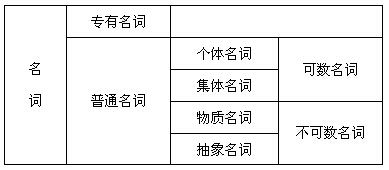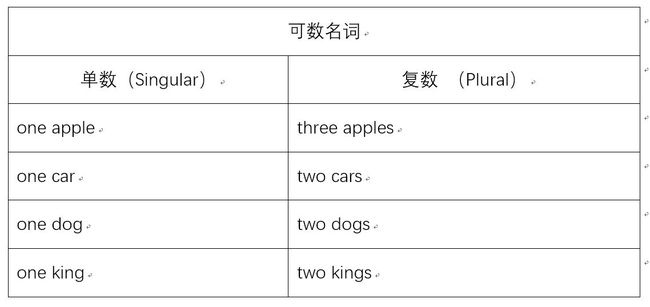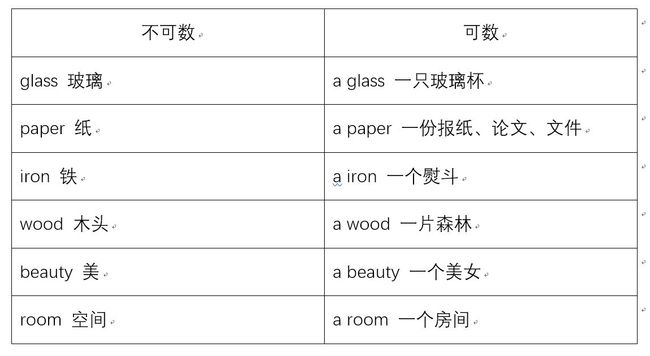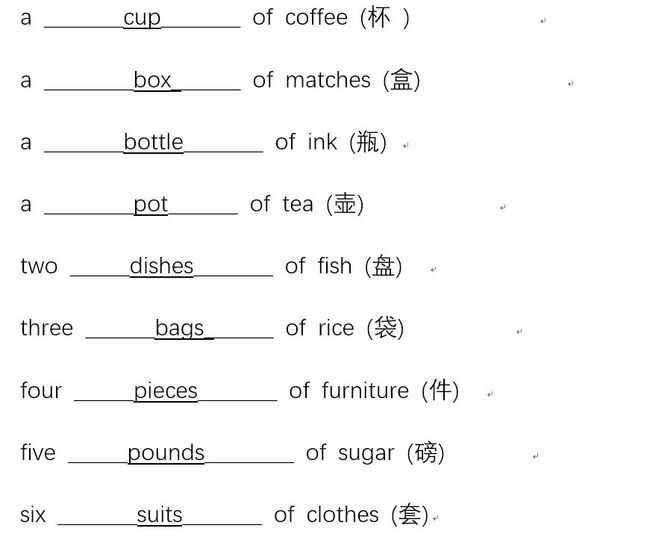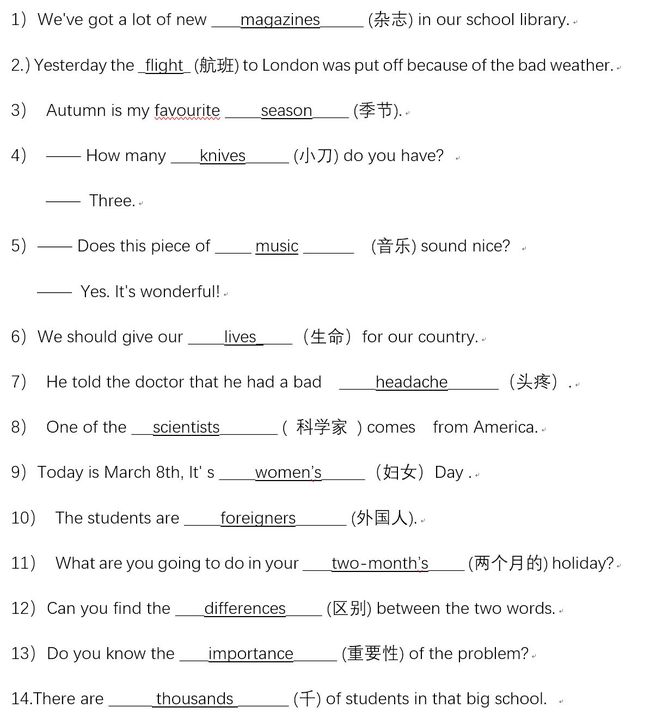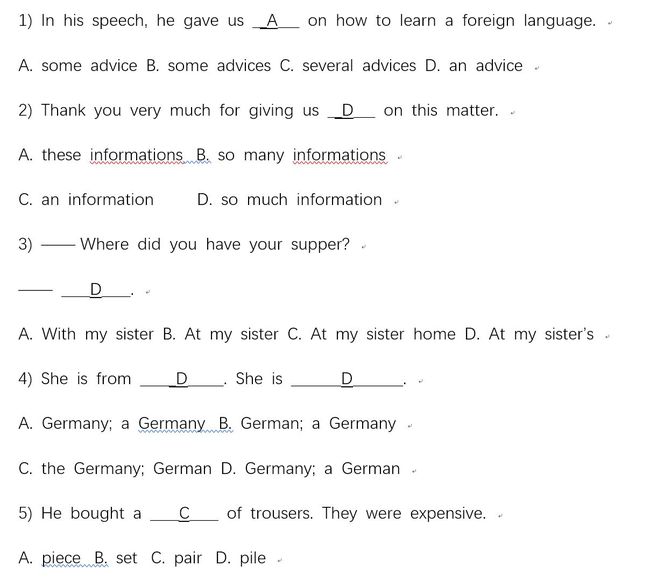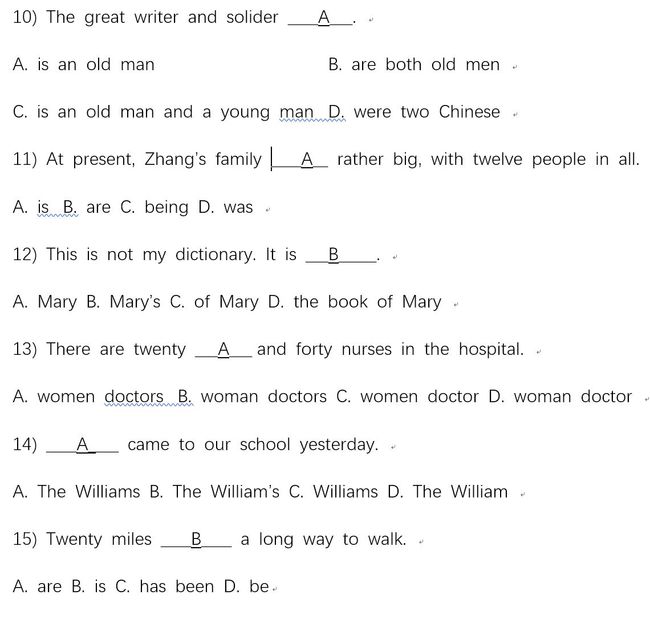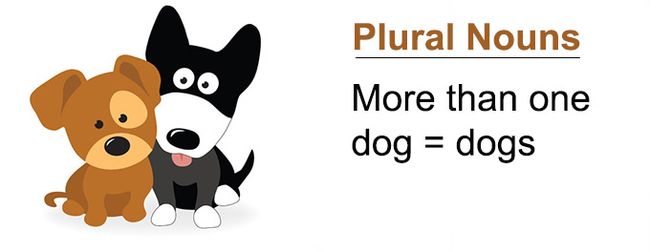一、 词类
1、单词(word)
单词是指能够自由运用的最小语言单位。
2、词类 (parts of speech)
词类是指根据词的形式、意义及其在句中的作用,所作的分类。英语中,根据词类的功能,单词被划分为十大类,即名词、冠词、代词、数词、形容词、副词、动词、介词、连词和感叹词。
英语十大词类,是学好英语这门课程的基础,只有基础学扎实了,以后学习句型和语法才会更轻松。
记忆口诀:
单词十类靠功用,名冠代数形副动,
介词连词感叹词,夯实基础莫放松。
二、 名词(noun)
1、 名词是指表示人、动物、事物、或地方名称的词。例如:
人:man; girl; Jane
动物:horse; tiger; duck
事物:car; blackboard; room
记忆口诀:
世上万物皆有名,事物名称是名词;
人类动物和事物,牢记于心不迟疑。
2、 名词分类
名词分为两大类:专有名词和普通名词。
1) 专有名词
专有名词表示特定的人、物、地方、机构等专有的名称。
专有名词的第一个字母通常要大写。例如:
Jim Green; New York; Bank of China; Peking University
星期、月份、节日、学科、报刊名也是专有名词。例如:
Monday; May; Christmas; Spring Festival; Math; China Daily
记忆口诀:
专有名词属独有,大写字母在词首;
人名地名机构名, 学科报刊跟着走。
星期月份节日名, 时刻牢记在心头。
2) 普通名词
(1)普通名词表示一类人或物或抽象概念的名称。例如:
family; air; boy; desk; work
(2)普通名词又可以分为四类:
① 个体名词 —— 表示某类人或东西中的个体。例如:
student; desk; girl; tree; book; cup
在通情况下,个体名词都是可数的。例如:
There is a book on the desk.
书桌上有一本书。
We have two children, a boy and a girl.
我们有两个孩子,一个男孩和一个女孩。
② 集体名词 —— 表示若干个体组成的集合体。例如:
class; family; family; group; team; police; furniture
为便于把握集体名词的特点,我们可以把它们分为两种:无生命的物质“类”和有生命的生物“群”。
表示物质“类”的集体名词,常见的有:furniture; baggage/luggage; jewelry; traffic; information; machinery; scenery
它们指同一类的许多东西,形式上总是单数,没有复数形式,作主语时,谓语用单数。如:
The old machinery is out of date.
这些旧机器过时了。
表示生命“群”的集体名词常见的有:people; police; cattle; poultry (家禽); vermin (害虫,寄生虫); family; class; team; government; crowd; committee; jury; couple; group; audience; public; mankind; youth
这类名词若把集体看作一个整体时,用作单数;若强调构成集体的各个成员时,则用作复数。例如:
My family is a large one.
我家是个大家庭。
My family are all workers.
我的家人都是工人。
集体名词表达多个集体时,也有复数形式。例如:
Our village is made up of 300 families.
我们村有300户人家。
③ 物质名词 —— 表示无法分为个体的物质名称。例如:
water; rice; hair; air; sand; meat; wine; paper; ink; gas; water; wood
在通常情况下,物质名词是不可数的。例如:
Air and water are necessary to life.
空气和水是生命所必需的。
Most of us probably eat too much meat.
我们大多数人都吃太多的肉了。
④ 抽象名词 —— 表示情感,状态,品质等抽象名称。例如:
love; carelessness; money,; failure,; work,; music,; courage; joy等。
抽象名词绝大多数是不可数的。例如:
Money isn’t everything.
金钱不是一切。
Failure is the mother of success.
失败是成功之母。
Loud music drives me crazy.
喧闹的音乐吵得我要命。
3) 名词分类表
记忆口诀:
名词分为两大类,专有普通记心间;
普通名词有四种,能否计数是关键;
个体集体分单双,物质抽象形不变。
三、 名词的数
英语的名词有“数“的区别。分为不可数名词和可数名词。
1、不可数名词
有些名词无法用数目来计算,比如物质名词和抽象名词,我们称之为“不可数名词。例如:
sugar; air; rice; tea; water; oil; knowledge; money; love
不可数名词没有数的变化。
2、可数名词
有些名词可以用数目了来计算,比如多数个体名词和集体名词,我们称之为可数名词。
可数名词在使用时有单数与复数的变化,表示一个用单数,多于一个用复数。例如:
大多数可数名词的复数形式是在单数形式后面加 ”s” 构成的。
四、 可数名词复数形式的构成规则
1、 一般名词在末尾直接加s,清辅音后读/ s /,浊辅音和元音后读/ z /。例如:
book-books; bag-bags; cat-cats; bed-beds
2、 以s、x、sh、ch结尾,加es,读/ IZ /。例如:
bus-buses; box-boxes; brush-brushes; watch-watches
3、 以辅音字母+y结尾,变y为i,再加es, 读/ z /。例如:
baby-babies; library-libraries; factory-factories
4、 以f或fe结尾,变f或fe为v,再加es,读/ vz /。例如:
thief-thieves; knife-knives; wife – wives; leaf – leaves
注意:roof例外,它的复数形式是roofs。
5、以o结尾,表示无生命的物体时加s, 表示有生命的物体时,加es,都读 / z /。例如:
无生命的物体:photo-photos; piano-pianos; radio-radios; zoo-zoos
有生命的物体:potato-potatoes; tomato-tomatoes; mango-mangoes; hero-heroes
6、不规则变化,需要在学习中逐个记忆。例如:
man-men; child-children; foot-feet; fish-fish; woman-women; mouse-mice; tooth-teeth; sheep-sheep; policeman-policemen; ox-oxen; goose-geese; deer-deer
7、有些可数名词单复数同形;但强调种类时,其复数形式有变化。例如:
My cat had two fish for lunch. (单复数同形)
You can see a lot of different fishes in the lake.(强调种类)
记忆口诀:
名词形式有双单,能否计算记心间;
不可数词用原形,复数变化不可乱。
五、“量词“的用法
英语中,没有量词这一类别。但是用容器类名词表示数量的用法很普遍。我们姑且把可用来表示数量的容器类名词当作“量词“来使用。
1、“量词“用于不可数名词
不可数名词一般只有原形,没有复数形式,但是可以借助“量词“来表示一定的数量。如果表达两个或两个以上的概念时,”量词“需要用复数形式,不可数名词不变。例如:
a bottle of water; a cup of coffee; two glasses of milk; five bags of rice; four pieces of paper
2、“量词“用于可数名词
这种形式用于可数名词时,量词和可数名词都要用复数。例如:
ten baskets of eggs
六、可数不可数含义不同的名词
有些名词既可用作可数名词,又可用作不可数名词。但其含义有所差别。例如:
记忆口诀:
量词属于新概念,不可数词好计算;
可数名词配量词,双方都把复数变。
七、名词所有格
1、名词所有格简介
名词所有格表示所有关系,即某物属于某人。例如:
Jim’s cup; the teachers’ office; men’s room; the dog’s foot;
名词所有格主要应用于人或动物等有生命的东西,无生命的事物通常不这么用。
2、名词所有格的构成:
① 单数名词的所有格,一般是在词尾加 “‘s” 构成。例如:
Tom’s book; Jack’s house; the lion’s tail
② 如果复数名词末尾已有s,就直接加 “’”。
the teachers’ office; the girls’ hats
③ 如果复数名词不是以 ”s” 结尾,则需要加 “’s”。例如:
women’s dresses; children’s books
④ 如果一些物品为两者共有,只需在后一个名词词尾加 ’s。例如:
Lucy and Lily’s bedroom.(Lucy 和 Lily共用一个卧室)
⑤ 如果一些物品为各自所有,则需在每个名词后加’s。例如:
Lucy’s and Lily’s bedrooms.(Lucy 和 Lily分别拥有各自的卧室)
⑥ 无生命物体的名词所有格,一般用of短语表示。例如:
a map of the world; the colours of the book; the top of the house
⑦ 在时间,距离,度量,价值等名词后,可用名词所有格。
two months’ time; today’s newspaper; fifty pounds’ weight
⑧ 表示店铺或某人的家时,常在所有格后省去shop, home.
the doctor’s; the tailor’s; my uncle’s; the barber’s
⑨ 双重所有格:把of所有格和 “’s” 所有格结合在一起表示所有关系。
名词前有冠词,数词,不定代词或指示代词时,用of词组+所有格表示。例如:
a friend of my father’s 我父亲的一位朋友
a photo of Mr Smith’s 史密斯先生的一张照片
that son of Jim’s 吉姆的那个儿子
that bike of Tom’s 汤姆的那辆自行车
记忆口诀:
所属关系所有格,有无生命心里搁;
有命使用撇埃斯 (‘s),无命多用呃夫 (of) 说。
八、作业
1、写出下列名词的复数形式。
1)shoe 2) orange 3) eye 4) month 5) fox
6) match 7) city 8) class 9) family 10) country
11) boy 12) key 13) leaf 14) thief 15 ) hero
16) photo 17} roof 18) woman driver 19) step-mother
20) sheep 21) Japanese 22) sister-in-law
2、填入恰当的量词
a ________________ of coffee (杯)
a ________________ of matches (盒)
a ________________ of ink (瓶)
a ________________ of tea (壶)
two ______________ of fish (盘)
three ______________ of rice (袋)
four ______________ of furniture (件)
five _______________ of sugar (磅)
six ________________ of clothes (套)
3、根据下列句子的情景及所给汉语注释,写出所缺单词:
1)We've got a lot of new __________ (杂志) in our school library.
2.)Yesterday the ________ (航班) to London was put off because of the bad weather.
3) Autumn is my favourite __________ (季节).
4) —— How many __________ (小刀) do you have?
—— Three.
5)—— Does this piece of ____________ (音乐) sound nice?
—— Yes. It's wonderful!
6)We should give our __________(生命)for our country.
7) He told the doctor that he had a bad ____________(头疼).
8) One of the ___________ ( 科学家 ) comes from America.
9)Today is March 8th, It' s ___________(妇女)Day .
10) The students are ____________ (外国人).
11) What are you going to do in your __________ (两个月的) holiday?
12)Can you find the ___________ (区别) between the two words.
13)Do you know the __________ (重要性) of the problem?
14.There are _____________ (千) of students in that big school.
3、选择填空
1)In his speech, he gave us _____ on how to learn a foreign language.
A. some advice B. some advices C. several advices D. an advice
2)Thank you very much for giving us _____ on this matter.
A. these informations B. so many informations
C. an information D. so much information
3) —— Where did you have your supper?
—— ________.
A. With my sister B. At my sister C. At my sister home D. At my sister’s
4) She is from __________. She is ______________.
A. Germany; a Germany B. German; a Germany
C. the Germany; German D. Germany; a German
5) He bought a ________ of trousers. They were expensive.
A. piece B. set C. pair D. pile
6) The town is about _________ ride from here. You ought to start right away.
A. two hour B. two hour’s C. two hours’ D. two-hours
7) A _______ of money has been spent on the building.
A. great deal B. good many C. plenty D. great number
8) ______ been made in science since then.
A. A great progress has B. Great progresses have
C. Great progress has D. Many progresses have
9) We must help ________.
A. a blind B. the blind C. people D. the people blind
10) The great writer and solider _______.
A. is an old man B. are both old men
C. is an old man and a young man D. were two Chinese
11) At present, Zhang’s family ________ rather big, with twelve people in all.
A. is B. are C. being D. was
12) This is not my dictionary. It is ________.
A. Mary B. Mary’s C. of Mary D. the book of Mary
13) There are twenty ______and forty nurses in the hospital.
A. women doctors B. woman doctors C. women doctor D. woman doctor
14) ________ came to our school yesterday.
A. The Williams B. The William’s C. Williams D. The William
15) Twenty miles ________ a long way to walk.
A. are B. is C. has been D. be
九、答案
1、写出下列名词的复数形式。
1)shoes 2) oranges 3) eyes 4) months 5) foxes
6) matches 7) cities 8) classes 9) families 10) countries
11) boys 12) keys 13) leaves 14) thieves 15 ) heros
16) photos 17} roofs 18) women drivers 19) step-mothers
20) sheep 21) Japanese 22) sisters-in-law
2、填入恰当的量词
3、 根据下列句子的情景及所给汉语注释,写出所缺单词:
4、选择填空

